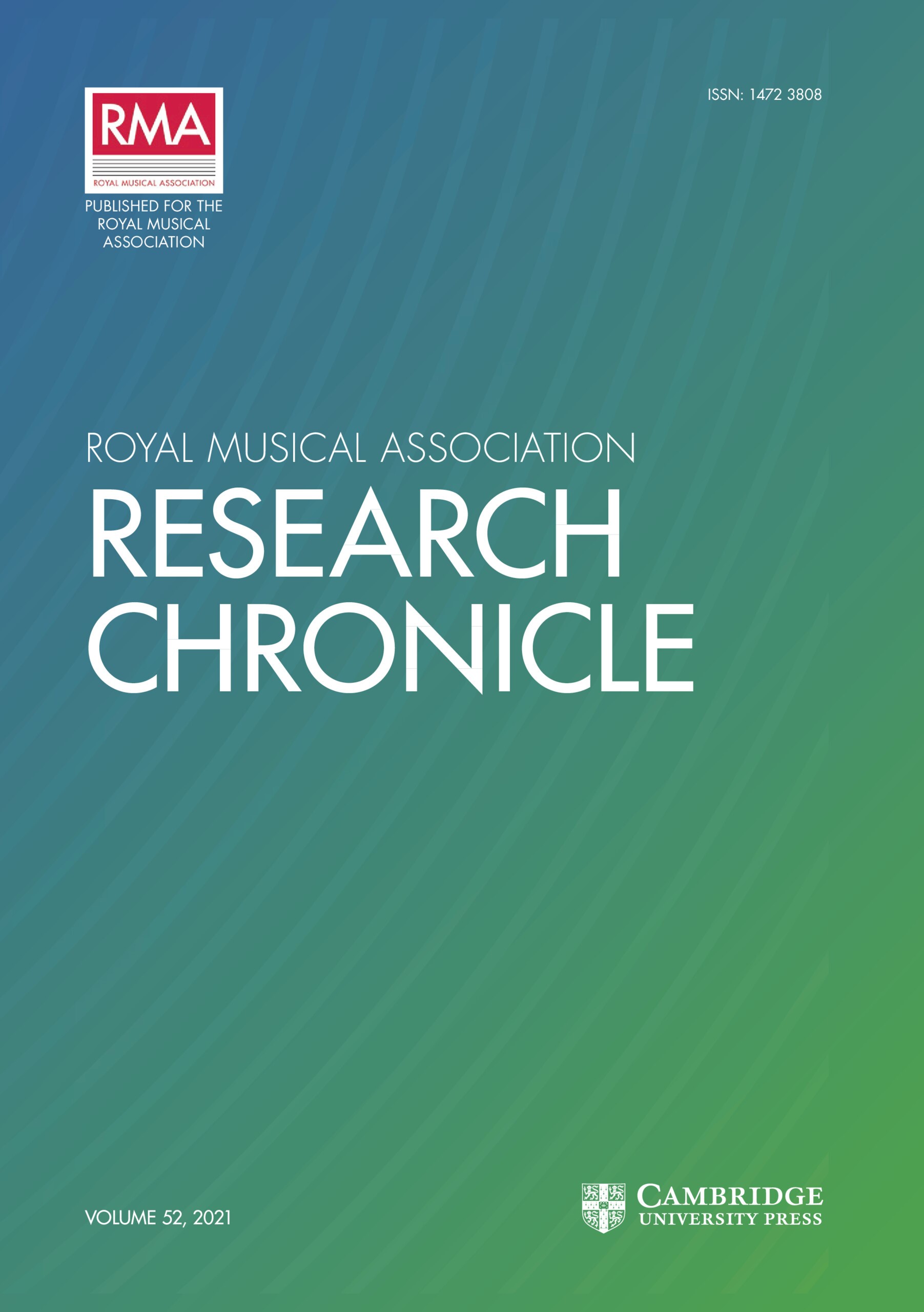No CrossRef data available.
Article contents
Online EDI Resources: Towards a Reflexive Archive
Review products
Published online by Cambridge University Press: 29 November 2021
Abstract

- Type
- Book Review
- Information
- Copyright
- © The Author(s), 2021. Published by Cambridge University Press on behalf of the Royal Musical Association
References
1 Asprou, Helena, ‘The Show Must be Paused: The Classical World Falls Silent to Honour George Floyd’, Classic FM, 2 June 2020, <https://www.classicfm.com/music-news/show-paused-classical-world-silent-george-floyd/> (accessed 22 August 2021).+(accessed+22+August+2021).>Google Scholar
2 ‘9 Black Composers who Changed the Course of Classical Music History’, Classic FM, 4 June 2020, (updated 6 October 2020), <https://www.classicfm.com/discover-music/black-composers-who-made-classical-music-history/> (accessed 22 August 2021).
3 While ‘EDI’ is often used in the UK as an umbrella term for all matters of equality, diversity, and inclusion, which includes topics such as gender, sexuality, religion, race, and disability, the themes of anti-racism and decolonisation have received heightened attention by academic institutions since the Black Lives Matter protests of 2020. It is important not to conflate these terms, and to contextualize the recent rise of decolonial and anti-racist resources as a sub-category of EDI topics.
4 Search engine results for the terms ‘music EDI resources’, ‘music decolonisation resources’, and ‘anti-racist music resources’ from my UK Internet connection at the time of writing this review revealed a range of music departments across the UK, the US and Canada that are compiling such open-access websites. I am acutely aware, however, that this does not mean that the higher education institutions of the Global North are alone in doing this work, and that what is ‘visible’ from a UK search engine or a university / department web page does not provide a full picture of EDI resources or conversations in the rest of the world.
5 For a summary of recent disciplinary controversies written for a general audience, see Ross, Alex, ‘Black Scholars Confront White Supremacy in Classical Music’, The New Yorker, 21 September 2020, <https://www.newyorker.com/magazine/2020/09/21/black-scholars-confront-white-supremacy-in-classical-music>>Google Scholar (accessed 1 September 2021).
6 See Tuck, Eve and Yang, K. Wayne, ‘Decolonization is Not a Metaphor’, Decolonization: Indigeneity, Education & Society 1, no. 1 (2012): 1–40 Google Scholar.
7 Hess, Juliet, ‘Decolonizing Music Education: Moving Beyond Tokenism’, International Journal of Music Education 1–2 (2015), 1 Google Scholar.
8 ‘Composers of Color Resource Project’, <https://composersofcolor.hcommons.org> (accessed 20 August 2021). In contrast to some of the other sites mentioned here, it is not immediately evident from the ‘Composers of Color’ web page who, exactly, has been involved in setting it up.
9 ‘Engaged Music Theory’, <https://engagedmusictheory.com> (accessed 20 August 2021).
10 The members of the working group are listed as: Co-organizers – Michèle Duguay, Marc Hannaford, and Toru Momii; and Group Members – Makulumy Alexander-Hills, Clifton Boyd, Michael Bruschi, Samuel Chan, Johanna Devaney, Kristi Hardman, Stephen Lett, Vivian Luong, Rowland Moseley, Nathan Pell, Blake Ritchie, Lauren Shepherd, Danielle Shlomit Sofer, and Noel Torres-Rivera. ‘About’, ‘Engaged Music Theory’, <https://engagedmusictheory.com> (accessed 1 September 2021).
11 See André, Naomi, Black Opera: History, Power, Engagement (Champaign, IL: University of Illinois Press, 2018)Google Scholar.
12 For example, the home page introduces the limitations of the bibliography by pointing to relevant work that is not included: ‘The bibliography purposefully omits work by scholars who do not self-identify as music theorists or musicologists, but whose work is indispensable to the aims of our group. A list of these authors would include Sara Ahmed, Daphne Brooks, Patricia Hill Collins, Rosemarie Garland-Thomson, Saidiya Hartman, Lisa Lowe, Fred Moten, José Esteban Muñoz, Christina Sharpe, Eve Tuck, and Alexander G. Weheliye, among many others. We strongly encourage anyone who is interested in the goals of our group to read and cite this body of scholarship’. ‘Engaged Music Theory’, <https://engagedmusictheory.com> (accessed 1 September 2021).
13 As the opening statement notes, ‘While this list is not meant to be exhaustive, we hope it offers a starting point for engaged music theoretical research. It focuses primarily on music theoretical work as well as directly relevant scholarship from musicology and ethnomusicology’. ‘Engaged Music Theory’, <https://engagedmusictheory.com> (accessed 1 September 2021).
14 The website does recently appear to be moving in this kind of exciting direction: as of October 2021, Engaged Music Theory has also introduced a blog series: <https://engagedmusictheory.com/blog/> (accessed 19 October 2021).
15 ‘Inclusive Early Music’, <https://inclusiveearlymusic.org> (accessed 1 September 2021).
16 The caption given for this image is ‘Musicians Playing Stringed Instruments. Madrid, San Lorenzo de El Escorial Library, The Cantigas de Santa Maria. Canticle n. 120’. ‘Inclusive Early Music’, <https://inclusiveearlymusic.org> (accessed 20 August 2021).
17 ‘Beyond Tokenism: Dismantling, Rethinking & Reframing Narratives in Music History Pedagogy’, <https://musichistoryredo.wordpress.com> (accessed 20 August 2021).
18 The listed ‘Policies and Project Team’ consists of: Jacqueline Avila, Joy Marie Doan, Kunio Hara, Jasmine A. Henry, and Eric Huang. ‘Beyond Tokenism’, <https://musichistoryredo.wordpress.com/policies-and-project-team/> (accessed 20 August 2021).
19 Venter, Carina, Fourie, William, Pistorius, Juliana M., and muyanga, neo, ‘Decolonising Musicology: A Response and Three Positions’, SAMUS: South African Music Studies 36–37 (2017), 149 Google Scholar.




